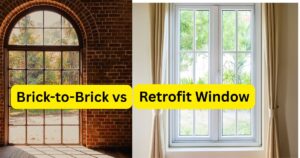Are you considering upgrading your patio doors? Whether you’re replacing an old set or investing in a new look for your home, it’s not always easy to know where to start.
And with Canada’s wide range of weather conditions, you may find it more confusing. To help you out, here are 15 questions about patio doors with detailed answers to make the right decision:
Question 1: What type of patio door is best for Canadian winters?
Wondering why your home feels colder than it should, even with the heat on? It might be your patio door.
In Canada’s brutal winters, you want a door that keeps the warmth inside. Double or triple-glazed glass is a must—this type of glass creates an insulating barrier that prevents heat loss.
But it’s not just about the glass. Pay attention to the frame, too—vinyl and fibreglass are your best options. They provide superior insulation and can withstand freezing temperatures without warping or cracking.
So, if you’re looking for energy efficiency, these materials will keep your home warm and your energy bills in check.
Question 2: Are sliding patio doors better than hinged ones?
Do you need to maximize your space, or do you have room for a swinging door? Sliding doors are ideal for smaller spaces because they don’t require extra clearance to open.
This makes them perfect for condos or tight spots where you don’t want the door to eat up space. Plus, they’re more energy-efficient because they form a tight seal.
In contrast, hinged doors (French doors) offer a more elegant, traditional look. They do need space to swing, but if you’ve got it, they can add a touch of class to your home.
Question 3: How do I choose the right patio door for energy efficiency?
Ever wondered why your home feels drafty even with the heat cranked up? You could be losing heat through your patio door.
Low-emissivity (Low-E) glass is the key to better insulation—it reflects heat into the room during the winter while blocking out UV rays in the summer.
Triple-glazed glass is even better if you live in a colder climate. It significantly reduces heat loss, making your home more energy-efficient.
Combine this with a vinyl or fiberglass frame that doesn’t conduct heat, and you’ll have a door that will save you money on heating and cooling costs for years.
Question 4: Do you need to worry about security with patio doors?
Is your patio door a potential security risk? Patio doors can be a weak point for burglars, so it’s essential to ensure they are secure.
The first step is to check the locking system—one lock won’t cut it. Look for multi-point locks, which secure the door at multiple points along the frame, making it harder to break into.
You can also opt for impact-resistant glass for an added layer of security. If you’re in a higher-risk area, consider a door with a reinforced frame, such as steel or aluminum.
Question 5: What are the best materials for patio doors in Canada?
Have you ever had a patio door that just couldn’t handle the cold or heat? Materials like vinyl and fibreglass are your best options when dealing with Canada’s extreme weather.
Vinyl is affordable, durable, and offers excellent insulation, making it perfect for cold winters and hot summers.
Fibreglass is stronger and more durable than vinyl, with better insulating properties. If security is a concern, steel is incredibly tough, but it’s more expensive.
Question 6: How do patio doors impact the value of my home?
Want to know what can instantly boost your home’s curb appeal? A sleek, modern patio door. Replacing old, worn-out doors with energy-efficient, stylish patio doors can significantly increase your home’s value.
Not only does it improve the exterior look of your home, but it also offers practical benefits like better energy efficiency, which will attract potential buyers.
Even if you’re not selling anytime soon, you’ll enjoy the long-term savings on your energy bills and the enhanced comfort of your living space.
Question 7: Can I install patio doors in the winter?
Worried about the cold weather making patio door installation impossible? Don’t stress. You can install patio doors during the winter months.
Professional installers like NUVO are equipped to handle installations even when the temperature drops. They ensure the job is done properly so the door seals tightly, keeping the cold outside.
Winter installations can help you save on heating costs if your current doors are inefficient, so it’s worth considering.
Question 8: How do I maintain my patio door during the Canadian winter?
Do you ever struggle to open your patio door in the winter? It could be due to ice buildup or debris in the tracks.
Regular maintenance can prevent this. Clean the tracks regularly to remove dirt, dust, and snow. Lubricate the rollers to keep the door sliding smoothly.
Check the weatherstripping around the door to ensure it’s in good condition. If it’s worn or damaged, replace it to avoid drafts. These simple steps will help keep your patio door working efficiently through those long and cold Canadian winters.
Question 9: How do I prevent patio doors from freezing shut in winter?
Is your patio door freezing shut every time it gets cold? Prevent this by keeping snow and ice from building up around the doorframe. Even a small amount of ice can make your door difficult to open.
Check the weatherstripping to ensure it’s intact and replace any damaged seals. Also, make sure the door is properly aligned—if it’s misaligned, it can lead to air gaps and freezing.
Question 10: What’s the difference between patio doors and French doors?
Wondering whether a patio door or a French door is better for your home? Patio doors are sliding, so they save space and are great for smaller areas. They also tend to be more energy-efficient because they seal tightly.
On the contrary, French doors are hinged and swing open. They require more space to operate but offer a more elegant and classic look.
If you’ve got the space, French doors can add a touch of luxury, while patio doors are perfect for those looking to save room without compromising on style.
Question 11: What’s the cost of installing patio doors in Canada?
Will upgrading your patio door break the bank? The cost of patio doors in Canada can range from $1,000 to $4,000 (estimated).
If you choose premium materials like fiberglass or energy-efficient glass, you can expect to spend closer to the middle or higher end of the spectrum. However, this is an investment in your home’s comfort and value.
Additionally, you’ll start seeing the return on your investment in terms of energy savings and improved curb appeal.
Question 12: How do patio doors help with home ventilation?
Have you ever noticed your home feeling stuffy during the warmer months? Patio doors, especially sliding models, offer excellent ventilation.
Just slide them open and let fresh air flow through your home. You can open them partially and still keep the bugs out with a screen.
This natural airflow can keep your home comfortable and cut down on the need for air conditioning, saving you money.
Question 13: Do patio doors block out noise?
Do you live in a noisy area and find it hard to relax inside? High-quality patio doors with double or triple glazing can significantly reduce outdoor noise.
If you’re tired of hearing traffic or neighbours, investing in good patio doors is one of the best ways to keep your home peaceful.
Noise reduction is one of the biggest perks of upgrading to energy-efficient doors, so don’t skip it if you live in a high-traffic area.
Question 14: Are patio doors weatherproof?
Are you wondering if patio doors can withstand Canadian weather? Yes, they can—but only if you choose the right one.
Patio doors with high-quality seals, weatherproof frames, and insulating glass are designed to handle everything from freezing winters to scorching summers.
Look for doors with triple glazing or Low-E glass, which offer better insulation and can withstand fluctuating temperatures without compromising performance.
Question 15: What kind of warranty should I look for on patio doors?
Are you wondering if the patio door comes with a solid warranty? You should look for a warranty that lasts at least 10 to 20 years. A good warranty should cover defects in both the door and installation.
Make sure to read the fine print to understand what’s covered, especially for issues like broken seals or glass failure. A solid warranty means peace of mind knowing you’re covered if something goes wrong down the road.



